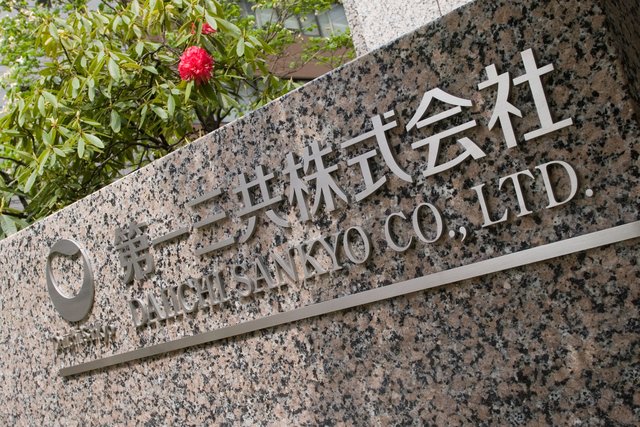Daiichi Sankyo and partner AstraZeneca’s next-gen antibody-drug conjugate datopotamab deruxtecan (Dato-DXd) has shown glimmers of efficacy and a reasonable safety profile in its first data release in breast cancer.
Having already seen some positives in its non-small cell lung cancer test, which is further along, Daiichi and AstraZeneca published the first look at Dato-DXd in triple-negative breast cancer (TNBC) at a late-breaking mini oral presentation at the 2021 European Society of Medical Oncology (ESMO) Breast Cancer Virtual Congress conference Saturday.
Nearly one year ago, AZ agreed to pay $1 billion upfront over two years for ex-Japan rights to the drug, which works as an ADC that targets tumor-associated protein TROP2, plus another $5 billion in milestones.
The drug combines an antibody targeting TROP2 that’s conjugated using a stable linker with a potent topoisomerase I inhibitor payload. It has a lower drug-to-antibody ratio that Daiichi suggests should both boost cell-killing activity and limit side effects.
The deal for the drug was after the success of AZ’s $6.9 billion deal for Enhertu (trastuzumab deruxtecan) from Daiichi, penned back in 2019. Within a few months of AZ coming on board, that drug was approved for patients with previously treated HER2-positive breast and gastric cancer. Dato-DXd will not be matching that record, but its TNBC data out over the weekend have the Japanese pharma optimistic about its future.
The data are still early, just a phase 1 and in only 21 patients, and Daiichi was keen to stress that there is a far way to go show just how well its drug workscu and how safe it will be in a larger patient population.
But in an early peek, the TNBC cohort of the TROPION-PanTumor01 phase 1 trial saw an objective response rate, assessed by blinded independent central review, hit 43% in 21 evaluable patients treated with Dato-DXd.
Five confirmed complete or partial responses were also seen, with four additional CR/PRs awaiting confirmation at the time of data cutoff on Jan. 8, 2021. A disease control rate of 95% was also observed.
No p-values have yet been assigned, but this favors well (with the many cross-trial comparison caveats abound) with what will likely be its main rival, Gilead/Immunomedics’ Trodelvy (sacituzumab govitecan-hziy), an antibody and topoisomerase inhibitor conjugate directed to the TROP-2 receptor, which has, among others, FDA approval in TNBC that has spread.
At ESMO 2020, Trodelvy showed an ORR of 35%, though this was a phase 3 with more patients, and it also saw overall survival with a median of 12.1 months versus 6.7 months for chemo. Future trials for Daiichi’s drug will look to assess its survival potential, a key weapon it will need for any approval, but the company saw reasons to be cheerful about its prospects from these data.
On the safety side there had been concerns about drug-related interstitial lung disease, which had been noted by analysts as being seen in earlier trials. Daiichi said no such ILD cases were seen in this test, though Gilles Gallant, Ph.D., senior vice president and global head, oncology development, oncology R&D at Daiichi, told Fierce Biotech that they could not say for sure that this was not an issue, and future trials are needed to find that answer.
It did see less instances of severe diarrhea than are usual with the tech it uses, though six patients did have to have dose reductions because of adverse events. Daiichi said that these were most commonly due to stomatitis (13%) and mucosal inflammation (8%). Grade 3 or higher treatment emergent adverse events, regardless of cause, occurred in 33% of patients. The most common adverse events overall were stomatitis, nausea, fatigue, vomiting, and alopecia. No-one left the test due to adverse events, however.
Gallant, who was cautious about the trial simply because of how early it is and the small number of patients, does believe the drug is best-in-class in terms of its construct which differs from the likes of Trodelvy.

